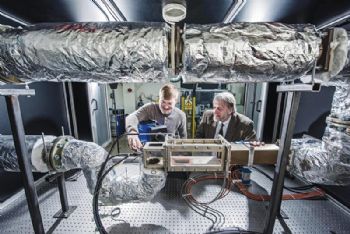
Technology developed by Loughborough University (
www.lboro.ac.uk) has the potential to significantly cut nitrogen oxide (NOx) emissions in diesel engines.
In 2015, the Government estimated that exposure to NOx and particulate emissions from diesel engines led to around 52,000 premature deaths in the UK; these emissions are also the primary cause of smog in major cities around the world.
These facts have led to growing pressure on vehicle manufacturers to reduce engine emissions, with new European NOx reduction targets for on-highway and heavy-duty diesel vehicles now so low they are almost impossible to meet.
The Ammonia Creation and Conversion Technology (ACCT) created by academics from the university’s School of Mechanical, Electrical and Manufacturing Engineering effectively increases the capacity of existing treatment systems.
Currently, almost all new diesel vehicles are fitted with a selective catalytic reduction (SCR) system to try and remove NOx produced by combustion. This system uses so-called AdBlue to safely provide the ammonia required to reduce NOx into harmless nitrogen and water.
The drawback is that AdBlue only functions well at high exhaust temperatures, typically in excess of 250ºC, which means SCR does not operate under all engine conditions — in particular, short stop-start commutes or on construction sites.
Moreover, the use of AdBlue at lower temperatures can result in severe exhaust blockages and subsequent engine damage.
ACCT is a conversion technology that uses waste energy to modify AdBlue to work effectively at these lower exhaust temperatures, significantly enhancing existing NOx reduction systems.
Loughborough’s Professor Graham Hargrave developed the technology with research associate Jonathan Wilson.
He said: “We are all familiar with the ‘cold start’, where diesel vehicles spew out plumes of toxic emissions before their catalytic systems are up to temperature and able to work effectively.
“Our system enables SCR systems to work at much lower temperatures — as low as 60°C. This means that the NOx reduction system remains active through the whole real-world driving cycle, leading to significant reductions in tailpipe emissions.”
While the Loughborough technology has so far been tailored for HGVs, it is fully scalable for use with all diesel vehicles.